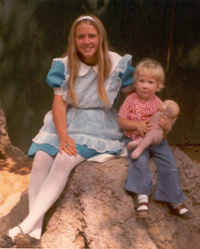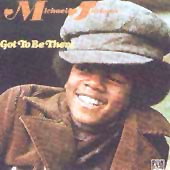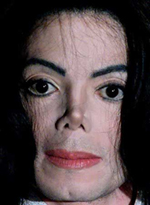Musings
an Online Journal of Sorts
By Alyce Wilson

Two Alices
My sister told me, not long ago, that a good portion of your lifestyle is set before you're even five. She said that whatever memories you recall from before the age of five are significant, because they helped shape your personality.
When I think back, I remember living a pretty happy life with my family. I got a lot of enjoyment out of being creative. I remember Mom showing me how to write my name, and I remember performing songs and dances on what I called The Stage in our apartment, which was a landing overlooking the living room.
I remember being afraid of the lowest keys on the piano, which sounded like bears.
My brother came into my life when I was 2. I remember standing over the crib and holding his hand. Far from being jealous, I was excited about the new arrival and have many happy memories of riding tricycles with my brother.
There were unhappy memories, too, such as the time I let the family dog out of the backyard by accident. He ran into the street and was killed.
And I remember being upset when my parents moved, when I was 5. The new house didn't have a Stage. I did get a purple bedroom, which was enough of a trade-off at the time.
When I think back on my early childhood, it's easy to understand why, even when I became a chubby bookworm in junior high, it only had so much of an impact. I knew my family loved me and that I'd always have their support.
This was far from the case with Michael Jackson, if the recently broadcast documentary on his life can be believed. The documentary, done by British journalist Martin Bashir, aired on ABC last night. In it, Michael reveals that his father beat him and his brothers while they were practicing.
As the child prodigy who took naturally to singing and dancing, Michael escaped many punishments but still had to endure his father beating his brothers while insisting, "Do it like Michael does it." He says he didn't face as many beatings, but when he did, they were severe.
This sort of behavior is bad enough and could help explain why he never wanted to look at himself in the mirror. The confusion and guilt produced by his father's beatings could definitely twist a young boy's soul.
But then, he went through adolescence. As many teens do, he had facial acne. According to what he told Bashir in the interview, his father was far from understanding. Joe Jackson used to tease him mercilessly for both the acne and for what he claimed was Michael's big nose, telling him he'd inherited neither of them from Joe.
This part of the story is so heartbreaking that you can understand why he wanted to change his face. In a revealing part of the interview, he tells Bashir that he hated himself so much it would have been preferable to wear a mask.
At other key points in the documentary, they're shopping in Las Vegas and Michael points out a replica of King Tut's sarcophagus, which he'd bought.
"Isn't the face beautiful?" he asked.
He also spent time suggesting fanciful masks for Bashir, whose dark-complected Indian ancestry makes him look closer to what Michael might have looked like today, without the surgeries.
It seems clear to me that while the rest of the world may see something freakish when they look at the Michael Jackson of 2002, he doesn't share that view. He's quite happy to live behind a mask.


The most disturbing part of the documentary was his persistant close contact with children. Since his settlement in the 1990s regarding a boy who claimed that he'd been sexually molested by Michael, it would have made sense to withdraw from such obvious connections. But Michael continues to invite disadvantaged children to Neverland and have sleep-over parties with the children, sometimes even sharing his bedroom.
He told Bashir that he wants to be Peter Pan and never wants to grow up. To me, this seems to point to perhaps even worse abuses than he admitted to in the interview. Perhaps sexual abuse, at the hands of his father?
Or even if that wasn't the case, isn't it possible that he decided a long time ago that if growing up was being like his dad, he never wanted to grow up? With Joe Jackson for his role model, I can't say I blame him.
Even facing similar circumstances, he might have turned out much happier in the long run if he hadn't been receiving huge checks every month since the time he was young. Every sort of indulgence a young, emotionally fragile boy could want was potentially within his grasp.
So what was he, growing older, to do when celebrity women like Tatum O'Neal and Brooke Shields began to be interested in him? While he still felt like a boy inside, they saw a man. The best way to avoid this reality was to hide his adult face from the world behind a fantastical mask, build his own Neverland and retreat into a fantasy life.
One of the most striking aspects of the documentary was that, when he talked to the young disadvantaged children who visited Neverland, that it was on a peer level. He wanted to fit in. And, for him, this must be the true test of his everlasting youth, a world of innocence.
While the documentary didn't show any hints of sexual behavior with the children, it does seem as if he's retreated dangerously far from reality, and there's no telling what affect this would have on the children who interact with him. Including, of course, his own children, who will eventually learn that their father is very different from other people's dads.
It's interesting to me now that it was at age 13, when "Thriller" came out, that Michael was most appealing to me. For awhile, I thought the strange things the boys in school said about him were only out of jealousy, because of all the girls who liked him. But it wasn't long before this sort of news became to hard to ignore. And that is when, I must admit, my interest faded, even if my fascination did not.
So I came away from the documentary thinking two things: number one, it's a shame that Joe Jackson was never prosecuted for the terrible things he did to his children. Number two, that Michael's fame and fortune have ensured his spiral into the clutches of his mental disease. And unless someone who truly cares about him steps in and gets him help, his downward spiral will whip around faster and faster to an inevitably tragic end.
Surprisingly, I rediscovered in the documentary the same personality that appealed to me so many years ago: the gentle, kind, beauty-loving soul, who would give hugs to overwrought fans and who gets his musical inspiration from climbing trees. That's exactly the sort of gentleness and playfulness that I loved in 1983.
The most tragic thing about this whole story is how somebody with so much talent can become such a public spectacle, a vivid example of a bleeding wound. And all his money can do for him is make it deeper.
Moral:
Money and power aren't everything, especially when it comes your way at
age 5.
Copyright 2003 by Alyce Wilson
Other writings by Alyce about Michael Jackson:
My First Celebrity Crush
The Tyranny of Photography
(Wild Violet Vol. I Issue 1)
(Feb. 10, 2003)- Lifting the Mask
(Feb. 11, 2003) - Would Be Pundit
(Feb. 19, 2003) - MJ Fascination
(Feb. 22, 2003) - Michael Gets His Say
(March 5, 2003) - Bye-Bye Black Sheep
(November
19, 2003) - Cable News Junkie
(June
16, 2005) - My Two Cents
Other Michael Jackson links:
Tribute
to a tragic pop star: Anatomy
of a Face
What Michael Jackson might have looked like without surgery: 'Nasal
Cripple'
A
Photographic HisTory
of Michael Jackson's Face
The court
document outlining the 1993 charges
Which Michael Jackson era are you? Take
the quiz
Entertainment Weekly column: Man
in the Mirror
What
do you think? Share your thoughts
at Alyce's message board (left button):
![]()
![]()

